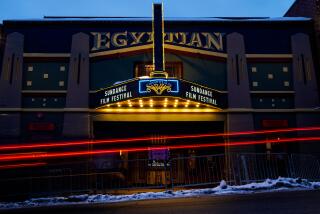The Godfather
- Share via
Tucked in the mountains of north-central Utah, the Sundance Film Festival, which runs through Jan. 29, is itself a production—the offspring of actor Robert Redford’s Sundance Institute and directed by Geoffrey Gilmore. Each year, Gilmore and his team wade through nearly 7,500 independent features, documentaries and short films, spurred on by a common charge: to identify and showcase the best of the best. It’s a daunting challenge—both a labor of love and a wintertime ritual of theatrical savoir-faire. Gilmore wouldn’t have it any other way.
*
This is your 16th Sundance Film Festival. How surprised are you that your run has lasted this long and been so successful?
As surprised as I am at anything. I certainly had a vision that independent film was something that would be taken seriously. What Sundance is and has become reflects that.To what do you attribute the longevity and success of what some are calling an institution?
It has a lot to do with the fact that the independent arena has become so important, and Sundance is one of the tent poles for that independent arena. The festival has been a platform for the introduction of talent as much as for the introduction of new film.The film industry continues to change, perhaps now more than anytime since 1930. How can independent film compete with the lavish budgets and orchestral sets of mainstream pictures?
I don’t think it tries to compete. Judgments tend to be made about film qualities and the level of artistic accomplishment as opposed to how many people walk through the box-office turnstile.Does Paramount’s recent agreement to purchase DreamWorks portend bad things for the independents in general?
There are still many more independent film companies than there were 10 years ago. I believe the consolidation that a DreamWorks/Paramount deal represents is much more about studio filmmaking than about the independent arena.Until recently, the festival’s film selection process was fairly secretive. Why open the doors to scrutiny now?
Part of what we’re trying to present is that it really isn’t a political process—it’s about the quality of films and the hard work that goes into assessing and selecting a program.What’s really the overriding criterion that Sundance uses in selecting a film? Good sense and Geoff Gilmore’s intuition?
It’s experience, analysis and interpretive skill as opposed to likes and dislikes. It isn’t the Geoff Gilmore Film Festival. It’s the Sundance Film Festival.What defines a good independent film, and does the formula differ from that of big-budget movies?
It’s personally and creatively driven. It’s writer driven. It’s driven by a passion for storytelling. It’s not driven by a vision for its market or commercial elements.What, if anything, has the festival done to discourage lobbying?
I don’t discourage lobbying in the sense that I’d have to pay more attention to it than I already do in order to discourage it.You and your staff view dozens of movies per day. How do you stay focused on the end goal—choosing the best movies while allowing the rest to succeed or fail on their merits alone?
We work at it. We take notes, we think about things, we discuss things, we make judgments, and we allow things that stick in our heads to stick in our heads. We tend not to be dismissive [and stay] open to the range of work that’s being submitted to us, and that openness is partly what allows a work to ultimately surface.How often do you miss the mark?
We’ve missed the mark a number of times. I don’t care that we miss the mark with a film that succeeds in the marketplace as much as I care that we actually got to see that film and make a decision about it.In Hollywood, legacies mean everything. When the dust clears, what do you hope your legacy will be?
I don’t take myself seriously enough to talk about my own legacy. Sundance has a legacy, and that legacy is about opening up possibilities for filmmakers and artists. I’m just the coattails.More to Read
Only good movies
Get the Indie Focus newsletter, Mark Olsen's weekly guide to the world of cinema.
You may occasionally receive promotional content from the Los Angeles Times.










